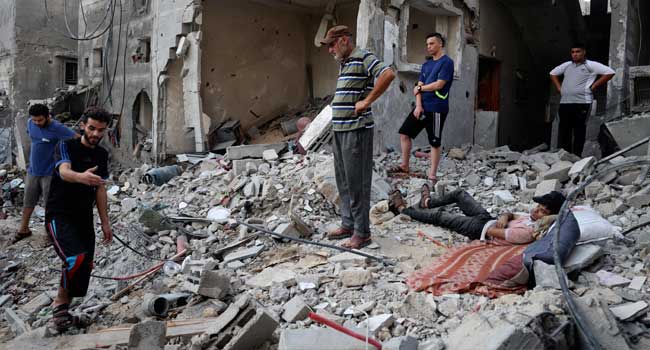Israel carried out fresh strikes on Gaza Sunday as its leaders came under growing pressure to secure the release of hostages still held in the Hamas-run territory more than two months after the October 7 attacks.
Prime Minister Benjamin Netanyahu faced protests on Saturday by relatives of hostages who called for an urgent deal to secure their freedom after the army admitted mistakenly killing three captives in Gaza.
The trio were among an estimated 250 people taken hostage during Hamas’s October 7 raids into Israel, which also killed about 1,140 people, according to the Israeli authorities’ latest figures.
According to Hamas, Israel’s retaliatory offensive in Gaza has killed 18,800 people, mostly women and children.
At a protest in Tel Aviv on Saturday, relatives of hostages gathered to plead with the government for a deal.
“Take us into consideration and come up with a plan now (for negotiation),” said Noam Perry, daughter of hostage Haim Perry, at the protest.
More than 100 of the Israelis and foreigners seized by Hamas and other militants on October 7 were released in exchange for 240 Palestinian prisoners during a week-long truce last month, mediated by Qatar.
Netanyahu doubled down on his war effort on Saturday, telling reporters of the three hostages’ deaths: “It broke my heart. It broke the whole nation’s heart.”
“With all the deep sorrow, I want to clarify: the military pressure is necessary both for the return of the kidnapped and for achieving victory over our enemies,” he added.
On Sunday, according to the Hamas-run health ministry in Gaza, at least 12 people were killed in Israeli strikes on the central city of Deir al-Balah.
Witnesses also reported Israeli air and artillery strikes on the southern municipality of Bani Suhaila east of Khan Yunis, the Gaza Strip’s second city.
On Saturday, Netanyahu appeared to address Qatari efforts towards a new truce.
“We have serious criticisms of Qatar, about which I suppose you will hear in due course, but right now we are trying to complete the recovery of our hostages,” he said.
In a statement, Qatar reaffirmed on Saturday its “ongoing diplomatic efforts to renew the humanitarian pause”.
But Hamas said on Telegram it was “against any negotiations for the exchange of prisoners until the aggression against our people ceases completely”.
US Defense Secretary Lloyd Austin said late Saturday he was travelling to Israel, Bahrain and Qatar to highlight Washington’s “commitments to strengthening regional security and stability”.
News platform Axios said Israeli spy chief David Barnea met Friday in an unspecified European location with Qatari Prime Minister Sheikh Mohammed bin Abdulrahman Al Thani, who helped negotiate the earlier truce.
‘Hunger, disease, weak immunity’
Israel’s bombardment of Gaza has left much of the territory in ruins, with the UN estimating 1.9 million Gazans have been displaced by the war.
The UN said this week that hunger and desperation were driving people to seize humanitarian aid being delivered to Gaza, warning of a “breakdown of civil order”.
International aid organisations have struggled to get supplies to desperate Gazans.
“I would not be surprised if people start dying of hunger, or a combination of hunger, disease, weak immunity,” said Philippe Lazzarini, the head of the UN agency for Palestinian refugees.
The agency reported a “prolonged communications blackout” across Gaza that started on Thursday night and has continued over the past 48 hours.
US President Joe Biden, whose administration provides billions of dollars in military aid to Israel, has voiced growing concern over civilian deaths.
UK Foreign Minister David Cameron and his German counterpart Annalena Baerbock wrote in The Sunday Times that the “need is urgent” for a “sustainable ceasefire” in Gaza.
In the face of mounting international pressure, Israel announced a “temporary measure” to allow aid deliveries directly to Gaza through the Kerem Shalom border crossing.
Fierce fighting raged in Gaza on Saturday, with the Israeli army saying it had raided two schools which it said were Hamas hiding places in the northern Gaza City.
The Israeli army said Sunday two more soldiers had been killed in Gaza, bringing the total to 121 since ground operations began in late October.
The Latin Patriarchate of Jerusalem said a Christian mother and daughter were shot dead by an Israeli soldier on the grounds of the Gaza Strip’s only Catholic church.
In the city of Khan Yunis, dozens of journalists took part in a funeral for Al Jazeera cameraman Samer Abu Daqqa, who was killed in an Israeli strike, according to his news organisation.
More than 60 journalists and media staff have died since the war began, according to the Committee to Protect Journalists.
Red Sea disruption
The war continues to be felt across the Middle East and has raised fears of a broader conflict.
Israel has exchanged regular fire with militants, mainly the powerful Iran-backed Hezbollah, across its northern border with Lebanon.
The Israeli army said on Saturday a soldier was killed and two others wounded in the Margaliot area on the Lebanese boundary.
A spokesperson confirmed to AFP the casualties were caused by a “hostile aircraft”.
The conflict has also caused major disruption to the key Red Sea shipping lane between Asia and Europe, with two more major firms announcing they were redirecting their vessels following repeated attacks by Yemeni rebels allied with Hamas.
The action by Mediterranean Shipping Company (MSC) and CMA CGM follows similar moves on Friday by Maersk and Hapag-Lloyd.
It comes after Yemen’s Iran-backed Huthi rebels launched repeated attacks on passing vessels in recent days.
The rebels also launched a wave of 14 one-way attack drones on Saturday, all of which were “shot down with no damage to ships in the area or reported injuries”, the US military’s Central Command said.
AFP







